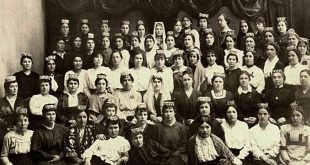An American high-school Catholic student, Zion Lourdes Perez, wore a hijab, exposing her to the everyday challenges faced by Muslim women.
She was walking home from school, with traffic rushing all around, when Zion Lourdes Perez tore off her hijab. Feeling like a target at 15 was nothing she’d imagined when she decided, on a lark, to wear the head scarf worn by Muslim women.
Perez, raised Catholic, is a co-founder and president of the Muslim Student Association at Franklin High, and while many students tried on the covering for an hour or two during “modesty week,” Perez wanted a deeper understanding of what it meant to broadcast religion on one’s sleeve — or head, as it were. The experience last year made her think about Jews forced to wear yellow stars during the Holocaust.
“It was overwhelming,” she said. “I felt like people were staring at me, whipping around to look — really negative vibes, like I was some kind of threat or foreigner. When I tore it off, I was relieved. All I wanted was to blend in.”
But Perez had intended to wear the hijab for a full week, not just a few hours, so the next day she put it on again.
“I have a whole new respect now,” she said of Muslim women, many of whom believe they must show their affiliation to a religion increasingly under attack on social media, political rallies and on the streets outside Perez’s school. “They really have to be strong. It takes tremendous courage to walk around wearing hijab.”
South Seattle is often described as the region’s most diverse neighborhood. But even as an ersatz-Muslim, Perez felt safe only within Franklin’s walls.
Other students echo this perspective. During a workshop at the school recently to honor the legacy of the Rev. Dr. Martin Luther King Jr., Perez and 40 other teens gathered to talk about “Islamaphobia” in the wider community. Most of the Muslims reported being followed or gawked at as soon as they stepped beyond their hilly campus.
Only one white student, Samuel Aronwald, was present to listen.
“I feel like this is a really large issue,” he said, noting the evolution in his own views. “Six months ago, I didn’t understand Muslim people and I thought Islam was not the greatest thing.”
Aronwald, a senior considering psychology as a career, has begun to think hard about the effect of being part of a stigmatized group. Asked to describe the religion in one word, he whispered “misunderstood.”
The number of Muslim youth at Franklin has ballooned in recent years, but many other students have little knowledge of the culture.
 Ijtihad Network Being Wise and Faithful Muslim in the Contemporary World
Ijtihad Network Being Wise and Faithful Muslim in the Contemporary World
